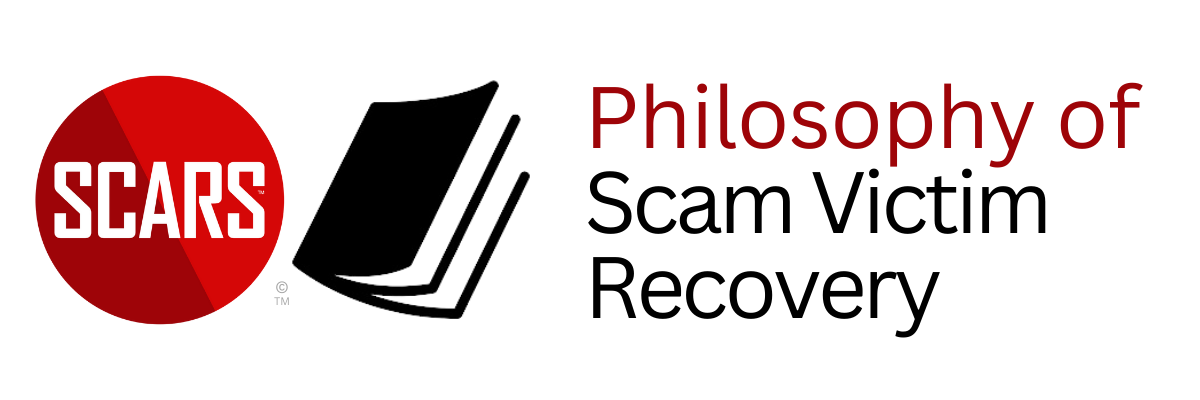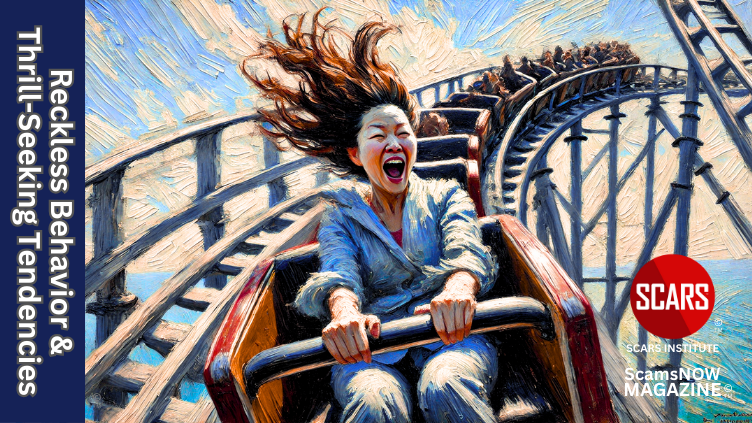Koyaanisqatsi – A Life Out of Balance
Koyaanisqatsi: Restoring Balance in the Lives of Scam Victims After the Scam
Primary Category: Scam Victim Recovery Philosophy
Author:
• Tim McGuinness, Ph.D., DFin, MCPO, MAnth – Anthropologist, Scientist, Polymath, Director of the Society of Citizens Against Relationship Scams Inc.
About This Article
The Hopi word Koyaanisqatsi, meaning “life out of balance,” powerfully describes the experience of scam victims in the aftermath of deception. Every dimension of life—emotional, psychological, physical, relational, and financial—can become destabilized, creating chaos that demands a new way of living. Victims often face shame, fear, disrupted sleep, financial insecurity, and strained relationships, all of which mirror the disorder expressed in the concept of Koyaanisqatsi. Mindfulness practices offer a path toward restoring balance by helping individuals calm emotional storms, regain mental clarity, reduce physical stress, reestablish healthy work habits, and rebuild connections with others.
Through intentional awareness and daily practices like breathing, grounding, and self-compassion, scam victims can begin to recover a sense of control and peace. By recognizing imbalance not as a permanent condition but as a call for change, victims can rebuild a life centered on presence, resilience, and meaning. Koyaanisqatsi becomes not just a description of their suffering but a guide toward recovery.
Note: This article is intended for informational purposes and does not replace professional medical advice. If you are experiencing distress, please consult a qualified mental health professional.

Koyaanisqatsi: Restoring Balance in the Lives of Scam Victims After the Scam
The word “Koyaanisqatsi” is pronounced as [ˈkoɪ̯aːnɪsˈkɑt͡si].
The Hopi word Koyaanisqatsi translates to “life out of balance,” a concept that captures a state of existence so chaotic that it demands a new way of living. For you, a scam victim, this term resonates deeply in the aftermath of deception, as the scam leaves your life spiraling into disarray across emotional, psychological, physical, relational, and financial dimensions. The struggle to recover often feels like navigating a world turned upside down, where every aspect of your being yearns for equilibrium.
Let’s try to explore how the scam throws your life out of balance and how mindfulness practices can guide you toward restoration, helping you reclaim harmony in your emotions, psychology, physical health, work-life balance, relationships, family life, and financial affairs. Let’s dive into this journey with a compassionate lens, understanding the chaos and offering a path to healing.
Koyaanisqatsi – The Emotional Chaos: A Heart in Turmoil
After a scam, you often find your emotions in a whirlwind, a stark reflection of a life out of balance. You feel intense shame for falling for the deception, blaming yourself for not seeing the signs, and this self-blame breeds anger, not just at the scammer but at yourself. Grief washes over you as you mourn the loss of trust, the betrayal cutting deep into your sense of safety. Anxiety creeps in, making you question every interaction, wondering if you can ever trust again. These emotions swirl together, creating a storm that leaves you feeling unmoored, unable to find solid ground. Your heart, once open to connection, now guards itself, fearing further hurt, and this imbalance disrupts your ability to experience joy or peace.
Mindfulness practices offer a way to restore emotional balance. You can start by sitting quietly each day, focusing on your breath, allowing yourself to notice your emotions without judgment. When shame arises, acknowledge it gently, saying to yourself, “I feel shame, but this does not define me.” This practice helps you separate your emotions from your identity, reducing their overwhelming power. You might also try a body scan, noticing where tension lives, perhaps in your clenched jaw or tight chest, and breathing into those spaces to release the emotional weight. Over time, mindfulness teaches you to sit with your feelings, understanding their impermanence, and slowly, you rediscover a sense of calm, your emotional world finding a steadier rhythm.
Koyaanisqatsi – The Psychological Strain: A Mind Adrift
Psychologically, the scam leaves you in a state of disarray, your mind grappling with the fallout of betrayal. You experience intrusive thoughts, replaying the scam over and over, questioning every decision you made. This mental loop fuels self-doubt, eroding your confidence and leaving you feeling powerless. You might struggle with hypervigilance, constantly on edge, scanning for threats in every email or phone call, a state that mirrors the Hopi concept of chaos. Depression can set in as you wrestle with the loss of your former sense of self, feeling disconnected from the person you once were. Your mind, once a place of clarity, now feels like a labyrinth with no exit, a perfect example of a life out of balance.
Mindfulness helps you anchor your mind, bringing it back into alignment. You can practice mindful journaling, writing down your thoughts without censoring them, then reading them as an observer, noting patterns without judgment. This allows you to see your intrusive thoughts for what they are, temporary visitors rather than permanent residents. You might also engage in grounding exercises, such as focusing on five things you can see, four you can touch, three you can hear, two you can smell, and one you can taste, pulling your mind back to the present moment. These practices reduce hypervigilance, helping you rebuild trust in your own judgment. Over time, you notice your mind becoming a safer space, less chaotic, as you cultivate a sense of mental balance through consistent mindfulness.
Koyaanisqatsi – Physical Health: A Body Under Stress
The scam’s impact extends to your physical health, throwing your body into a state of imbalance. Stress hormones like cortisol surge, leaving you exhausted yet unable to sleep, your nights filled with restless tossing. You might lose your appetite or turn to comfort eating, your body’s rhythms disrupted by the emotional turmoil. Tension headaches become frequent, and your shoulders are tight from carrying the weight of betrayal. You feel drained, your energy sapped, as the scam’s aftermath takes a toll on your physical well-being, a clear sign of Koyaanisqatsi manifesting in your body.
Mindfulness practices restore balance to your physical health by calming your body’s stress response. You can try progressive muscle relaxation, tensing and releasing each muscle group while focusing on your breath, which helps ease physical tension and promotes better sleep. Mindful eating encourages you to savor each bite, noticing the texture and flavor, helping you reconnect with your body’s natural hunger cues. You might also take short walks, focusing on the sensation of your feet touching the ground, the breeze against your skin, grounding yourself in the present, and reducing cortisol levels. These practices help your body find its rhythm again, easing the physical strain and bringing you closer to a state of balance where you feel energized rather than depleted.
Koyaanisqatsi – Work-Life Balance: A Professional Disconnect
Your work-life balance suffers greatly after the scam, as the chaos spills into your professional world. You struggle to focus, your mind distracted by thoughts of the scam, making it hard to meet deadlines or engage with colleagues. You might withdraw from work social events, feeling too ashamed to face others, fearing they’ll judge you for being deceived. If you’re self-employed, the financial loss might force you to work longer hours, leaving little time for rest or personal life, further deepening the imbalance. You feel disconnected from your career, your sense of purpose overshadowed by the scam’s fallout, a stark example of a life out of balance in your professional sphere.
Mindfulness helps you regain work-life balance by fostering focus and presence. You can set aside five minutes before work to practice mindful breathing, clearing your mind of intrusive thoughts, and preparing to engage fully in your tasks. During breaks, step away from your desk and practice a brief meditation, focusing on your breath to reset your attention. You might also establish boundaries, using mindfulness to notice when you’re overworking, and consciously choose to stop, perhaps by taking a moment to stretch and breathe deeply, reminding yourself that rest is essential. Over time, you find yourself more present at work, able to separate your professional life from the scam’s emotional weight, restoring a sense of balance that allows you to thrive in your career while making space for personal healing.
Koyaanisqatsi – Relationships and Family Life: A Social Rift
The scam creates rifts in your relationships and family life, throwing these vital connections into disarray. You withdraw from friends, fearing judgment or pity, your shame isolating you from those who once brought you joy. Family dynamics shift as well, especially if you lost money meant for shared goals, like a child’s education fund, leading to tension or arguments. You might lash out at loved ones, your anger and mistrust spilling over, or retreat into silence, unable to share your pain. Your relationships, once a source of support, now feel strained, a clear sign of Koyaanisqatsi as your social world loses its harmony.
Mindfulness helps you rebuild these connections by fostering emotional awareness and communication. You can practice mindful listening, giving your full attention to a loved one without planning your response, which helps you reconnect and rebuild trust. During tense moments, take a mindful pause, breathing deeply to calm your anger before responding, ensuring your words come from a place of understanding rather than frustration. You might also share a mindful activity with your family, like a walk where you all focus on the sounds of nature, creating a shared moment of peace that strengthens your bond. Over time, mindfulness helps you let go of shame, allowing you to open up to your loved ones, restoring balance to your relationships and family life as you rediscover the warmth of connection.
Koyaanisqatsi – Financial Affairs: A Fiscal Imbalance
Financially, the scam leaves you in a state of profound imbalance, as you grapple with the loss of your savings or even your financial security. You might have sent tens or hundreds of thousands of dollars to the scammer, draining your bank account and leaving you with debts or unpaid bills. The stress of this loss keeps you awake at night, worrying about how to make ends meet, perhaps forcing you to dip into retirement funds or sell valued possessions. You feel a deep sense of insecurity, your financial stability shattered, a clear manifestation of a life out of balance as you struggle to regain control over your fiscal affairs.
Mindfulness helps you restore financial balance by reducing stress and restoring clarity in decision-making. You can practice mindful budgeting, sitting down with your finances and focusing on each expense without judgment, noticing where you can cut back or prioritize. This practice helps you approach your financial situation with calm rather than panic, empowering you to make thoughtful choices. You might also use a gratitude meditation, reflecting on the resources you still have, such as a steady income or a supportive friend, which shifts your perspective from scarcity to abundance. Over time, mindfulness helps you rebuild your financial security step by step, creating a budget that aligns with your needs and goals, restoring a sense of balance as you regain control over your fiscal life.
Koyaanisqatsi – The Path to Restoration: Embracing Mindfulness
The concept of Koyaanisqatsi illuminates the profound imbalance that scam victims face, but it also points to the need for a new way of living, a path toward restoration. Mindfulness practices offer you a powerful tool to address this chaos, helping you restore balance across every aspect of your life. You learn to calm your emotional storms, anchor your wandering mind, ease your physical tension, focus at work, reconnect with loved ones, and manage your finances with clarity. Each mindful moment becomes a step toward harmony, a way to realign your life with a sense of peace and purpose. The scam may have thrown your world into disarray, but through mindfulness, you find the strength to rebuild, creating a life where balance is not just a distant hope but a daily reality, a testament to your resilience and the power of living in the present.
Our Path to Mindfulness
- Mindfulness Breathing For Scam Victims’ Recovery
- Scam Victims In The RAIN – A Mindfulness Approach For Recovery [UPDATED 2025]
- Anxiety And Mindfulness – A Tool For Scam Victims – [VIDEOS]
- Nirvana and the Path to Letting Go of Suffering
- Recovery and Life Balance for Scam Victims
- The Challenge of Staying Present: A Human Struggle for Scam Victims
- The Myth of the “One-Time Lesson”: Why Scam Victims Recovery Requires Ongoing Effort and Emotional Vigilance
- Glimmers of Light – the Positive Side of Experience for Scam Victims
- Don’t Forget to Read this – I almost Forgot to Write it
- Tam Giáo and Obligation – a Necessary Requirement for Scam Victim Recovery
- Japanese Geidō: Helping Scam Victims to Master Their Life and Art
- Eremitism – Living in Solitude while Healing for Scam Victims
- Compassionate Reframing – a Very Important Recovery Tool for Scam Victims
- Onbaitori – Finding Your Own Pace for Scam Victims on the Yellow Brick Road of Recovery
- A Life Gone Into Chaos and How to Restore Order for Scam Victims in Recovery
- Jing (静) – the Silence that lets You Listen to Yourself for Scam Victim Recovery
- The Transformational Journey of Scam Victims Through Recovery
- Understanding Distorted Thinking for Scam Victims
- The Unfairness of Being a Scam Victim
- Theory of Capabilities and Scam Victims
- Awakening from the Dream of Thought for Scam Victims
- Poiesis – The Philosophy of Building a New Life After the Scam for Scam Victims
- Conscientiousness for Scam Victim Recovery Helps Guarantee Success
- Becoming Formidable Through Recovery for Scam Victims
- Scam Victims’ Pain and Suffering – Sailing the 8 Worldly Winds
- Scam Victims Finding Meaning in Life After the Scam
- Awakening a Fearless Heart in Scam Victims
- The Philosophy of Scam Victim Recovery: Understanding Why Recovery is Important – An Essay
- Solitude vs. Isolation in Scam Victims
- Cooking As Therapy For Scam Victims
- For Scam Victims – The Idea Of Happiness – Finding It Again
- Labyrinth Walking and Spiral Walking Meditation for Scam Victims
- Rebuilding Trust: The Scam Victim’s Journey from Victimhood to Empowerment
Reference
Koyaanisqatsi – A Life Out of Balance
Koyaanisqatsi is a Hopi word that translates to “life out of balance” or “a state of life that calls for another way of living.” It comes from the Hopi language, spoken by the Hopi people, a Native American tribe primarily located in northeastern Arizona. The term is a compound word: “koyaanis” means “corrupted” or “chaotic,” and “qatsi” means “life” or “existence.” Together, they convey a profound concept about a world or existence that is disordered, imbalanced, or in disarray, often interpreted as a critique of modern society’s disconnection from nature and traditional values.
The word gained wider recognition through its use as the title of a 1982 experimental documentary film directed by Godfrey Reggio, with music by Philip Glass. The film, part of the Qatsi trilogy, uses striking imagery and time-lapse photography to depict the collision between human technological progress and the natural world, illustrating the Hopi concept of life out of balance. It shows bustling cities, industrialization, and environmental degradation juxtaposed with serene natural landscapes, suggesting that humanity’s relentless pursuit of progress has created a chaotic, unsustainable existence. The Hopi believe that such an imbalance requires a return to harmony, often through spiritual or communal practices that realign human life with the natural order.
In a broader cultural context, “Koyaanisqatsi” has been used to describe modern societal issues, such as overconsumption, environmental destruction, and the alienation caused by technology. The film’s impact has led the term to be invoked in discussions about climate change, urban sprawl, and the loss of indigenous wisdom, reflecting the Hopi worldview that sees balance as essential for survival. For example, the Hopi prophecy, often associated with the term, warns of a time when the world becomes “koyaanisqatsi,” predicting natural disasters and societal collapse if humanity does not change its ways, a message that resonates with contemporary environmental movements.
The concept remains a powerful lens for examining the state of the world in 2025, where rapid technological advancements, such as AI and automation, continue to reshape society, often at the expense of environmental stability and human connection.
Koyaanisqatsi – The Movie 1982
Caution: May Be Triggering
Click Video To Play
-/ 30 /-
What do you think about this?
Please share your thoughts in a comment below!
TABLE OF CONTENTS
- Koyaanisqatsi: Restoring Balance in the Lives of Scam Victims After the Scam
- About This Article
- Koyaanisqatsi: Restoring Balance in the Lives of Scam Victims After the Scam
- Koyaanisqatsi – The Emotional Chaos: A Heart in Turmoil
- Koyaanisqatsi – The Psychological Strain: A Mind Adrift
- Koyaanisqatsi – Physical Health: A Body Under Stress
- Koyaanisqatsi – Work-Life Balance: A Professional Disconnect
- Koyaanisqatsi – Relationships and Family Life: A Social Rift
- Koyaanisqatsi – Financial Affairs: A Fiscal Imbalance
- Koyaanisqatsi – The Path to Restoration: Embracing Mindfulness
- Our Path to Mindfulness
- Reference
- Koyaanisqatsi – The Movie 1982
CATEGORIES
![NavyLogo@4x-81[1] Koyaanisqatsi - A Life Out of Balance - 2025](https://scamsnow.com/wp-content/uploads/2025/04/NavyLogo@4x-811.png)
ARTICLE META
Important Information for New Scam Victims
- Please visit www.ScamVictimsSupport.org – a SCARS Website for New Scam Victims & Sextortion Victims.
- SCARS Institute now offers its free, safe, and private Scam Survivor’s Support Community at www.SCARScommunity.org – this is not on a social media platform, it is our own safe & secure platform created by the SCARS Institute especially for scam victims & survivors.
- SCARS Institute now offers a free recovery learning program at www.SCARSeducation.org.
- Please visit www.ScamPsychology.org – to more fully understand the psychological concepts involved in scams and scam victim recovery.
If you are looking for local trauma counselors, please visit counseling.AgainstScams.org
If you need to speak with someone now, you can dial 988 or find phone numbers for crisis hotlines all around the world here: www.opencounseling.com/suicide-hotlines
Statement About Victim Blaming
Some of our articles discuss various aspects of victims. This is both about better understanding victims (the science of victimology) and their behaviors and psychology. This helps us to educate victims/survivors about why these crimes happened and not to blame themselves, better develop recovery programs, and help victims avoid scams in the future. At times, this may sound like blaming the victim, but it does not blame scam victims; we are simply explaining the hows and whys of the experience victims have.
These articles, about the Psychology of Scams or Victim Psychology – meaning that all humans have psychological or cognitive characteristics in common that can either be exploited or work against us – help us all to understand the unique challenges victims face before, during, and after scams, fraud, or cybercrimes. These sometimes talk about some of the vulnerabilities the scammers exploit. Victims rarely have control of them or are even aware of them, until something like a scam happens, and then they can learn how their mind works and how to overcome these mechanisms.
Articles like these help victims and others understand these processes and how to help prevent them from being exploited again or to help them recover more easily by understanding their post-scam behaviors. Learn more about the Psychology of Scams at www.ScamPsychology.org
SCARS INSTITUTE RESOURCES:
If You Have Been Victimized By A Scam Or Cybercrime
♦ If you are a victim of scams, go to www.ScamVictimsSupport.org for real knowledge and help
♦ SCARS Institute now offers its free, safe, and private Scam Survivor’s Support Community at www.SCARScommunity.org/register – this is not on a social media platform, it is our own safe & secure platform created by the SCARS Institute especially for scam victims & survivors.
♦ Enroll in SCARS Scam Survivor’s School now at www.SCARSeducation.org
♦ To report criminals, visit https://reporting.AgainstScams.org – we will NEVER give your data to money recovery companies like some do!
♦ Follow us and find our podcasts, webinars, and helpful videos on YouTube: https://www.youtube.com/@RomancescamsNowcom
♦ Learn about the Psychology of Scams at www.ScamPsychology.org
♦ Dig deeper into the reality of scams, fraud, and cybercrime at www.ScamsNOW.com and www.RomanceScamsNOW.com
♦ Scam Survivor’s Stories: www.ScamSurvivorStories.org
♦ For Scam Victim Advocates visit www.ScamVictimsAdvocates.org
♦ See more scammer photos on www.ScammerPhotos.com
You can also find the SCARS Institute’s knowledge and information on Facebook, Instagram, X, LinkedIn, and TruthSocial
Psychology Disclaimer:
All articles about psychology and the human brain on this website are for information & education only
The information provided in this and other SCARS articles are intended for educational and self-help purposes only and should not be construed as a substitute for professional therapy or counseling.
Note about Mindfulness: Mindfulness practices have the potential to create psychological distress for some individuals. Please consult a mental health professional or experienced meditation instructor for guidance should you encounter difficulties.
While any self-help techniques outlined herein may be beneficial for scam victims seeking to recover from their experience and move towards recovery, it is important to consult with a qualified mental health professional before initiating any course of action. Each individual’s experience and needs are unique, and what works for one person may not be suitable for another.
Additionally, any approach may not be appropriate for individuals with certain pre-existing mental health conditions or trauma histories. It is advisable to seek guidance from a licensed therapist or counselor who can provide personalized support, guidance, and treatment tailored to your specific needs.
If you are experiencing significant distress or emotional difficulties related to a scam or other traumatic event, please consult your doctor or mental health provider for appropriate care and support.
Also read our SCARS Institute Statement about Professional Care for Scam Victims – click here
If you are in crisis, feeling desperate, or in despair, please call 988 or your local crisis hotline – international numbers here.
More ScamsNOW.com Articles
A Question of Trust
At the SCARS Institute, we invite you to do your own research on the topics we speak about and publish. Our team investigates the subject being discussed, especially when it comes to understanding the scam victims-survivors’ experience. You can do Google searches, but in many cases, you will have to wade through scientific papers and studies. However, remember that biases and perspectives matter and influence the outcome. Regardless, we encourage you to explore these topics as thoroughly as you can for your own awareness.

























![scars-institute[1] Koyaanisqatsi - A Life Out of Balance - 2025](https://scamsnow.com/wp-content/uploads/2025/04/scars-institute1.png)

![niprc1.png1_-150×1501-1[1] Koyaanisqatsi - A Life Out of Balance - 2025](https://scamsnow.com/wp-content/uploads/2025/04/niprc1.png1_-150x1501-11.webp)